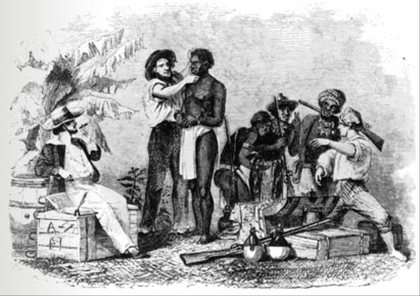 Having established that fundamentalism cannot be understood as a literal interpretation of religious texts or religious extremism, can it be understood as a strict adherence to a set of beliefs? This answer seems the most plausible to me, but I have yet to hear anyone explain exactly what this “set of beliefs” is and why it is universal to all religious (and secular) fundamentalists. At this point, we need to shift our focus to comparative mythology, as my background in this field has guided me in exploring this question. For those unfamiliar with comparative mythology, it is the survey of mythological archetypes, beliefs, stories, themes, and narratives from across many different human cultures in order to discover possible continuities and shared experiences between them. In other words, the comparative mythologists are trying to find common myths and beliefs which are shared by many human cultures. This is fascinating and important work because it reveals the basic mythological framework that underlays all our beliefs about the world, which holds implications for every single field of science and academic inquiry. Every ideology in the world—philosophical, religious, or scientific—can also be understood as a set of basic beliefs, or myths. When a comparative mythologist looks past the surface of an ideology and examines these basic myths, comparing and contrasting them to other ideologies, some very interesting discoveries happen; many opposing ideologies are revealed to be almost identical in their mythology, while other seemingly similar ideologies are revealed as having vastly different mythic structures. For example, the ideologies of capitalism and communism have been widely presented as polarities—two opposing political and economic worldviews. The Cold War(s) were financed and fought under the guise of these two ideologies duking it out on the global battlefields of history, and many people still believe this narrative. As a comparative mythologist, I see these two ideologies as almost identical in all their basic myths. Both ideologies accept the basic logic, structure, and processes of industrial civilization, they both employ rigid hierarchies to maintain their order, they both rely on Modernist assumptions of Science, and they both use oppressive State power to accomplish their ends. Neither of them question the institutions of Patriarchy or anthropocentrism, the role of technology, the realities of industrial agriculture, or the feasibility of building a system of production predicated on infinite growth while living on a finite planet. They both accept the constructs of linear time, a market economy, and private property, and the only areas where they actually diverge are in their interpretations of how this market should be regulated and how this property should be distributed. When these two ideologies are broken down into their basic myths and compared to other human myths, the differences are hardly discernible.
Comments
By: Joshua Kercsmar  As a historian who studies slavery and agriculture, I’m interested in probing the mutual oppression of humans and animals. Doing so has potential to offer new ways of understanding the past, and also to help us think more deeply about justice for humans and animals in the present. Toward that end, my current book project traces how the treatment of animals and slaves intersected on plantations in Virginia, South Carolina, and the Caribbean during the seventeenth and eighteenth centuries. We might think of the 1600s and 1700s as the beginning of modern industrial farming. This was a period that saw rapid modernization in many realms of agriculture, from crop rotations, to processing technologies, to animal breeding. Planters in North America and the Caribbean, who often grew crops like tobacco, rice, and sugar, and who needed livestock and slaves to keep their enterprises going, were caught up in these transformations. While they didn’t always or everywhere adopt new agricultural methods, they did so enough of the time to allow us to test whether agricultural modernization influenced planters’ treatment of animals and slaves.
 There are fewer words in the english language as cloaked in ambiguity and steeped in power as fundamentalism. It is a word which completely dominates social discourse, public opinion, and political rhetoric, yet remains undefinable and enigmatic. When pressed to explain what one means by this word, most pundits will allude to “literal interpretations of religious texts,” “religious extremism,” or “a strict adherence to a set of beliefs,” but fail to give any further context or description of what exactly makes one a fundamentalist, why fundamentalism exists, or why fundamentalists of all creeds seem to share so much in common. These are all questions that have fascinated me ever since the moment I realized, many years ago, that I was raised in a fundamentalist family and began to understand the many ways that this upbringing deeply affected me. An essential part of my healing from this traumatic upbringing has been studying the phenomenon of fundamentalism on all levels—sociological, historical, political, and psychological—in an effort to understand how ideas like this are created and perpetuated. As it turns out, my fascination with this cultural phenomenon is shared with many others. Since the dawn of the twenty-first century, and especially during the aftermath of the September 11th attacks in the US, perhaps no single word has held public attention so much, as governments around the world have taken advantage of the power that this word holds to create atmospheres of fear and paranoia which in turn allows them to enact draconian laws, create totalitarian surveillance systems, and incite nationalist fervor to an extent that they would never be able to get away with otherwise. Despite the massive amounts of media attention given to this topic and the endless procession of talking heads who attempt to provide answers to these questions, I have found myself continually frustrated and dissatisfied with their answers. In addition to my search for a basic explanation of what exactly fundamentalism is, my most pressing question has been trying to understand why fundamentalists from different religions share so much in common. This strange and terrifying cultural phenomenon seems to not be restricted to any particular tradition but is rather a non-localized personality disorder or sickness which affects people from all across the religious (and secular) spectrum. In the course of my studies in comparative religion, comparative mythology, philosophy, depth psychology, and theology, I have finally started to answer some of these questions for myself, and I think some of my discoveries may be helpful others. But before we explore what fundamentalism is, let's establish what it isn't. |
Disclaimer
The viewpoints expressed in each reader-submitted article are the authors own, and not an “official Jesus Radicals” position. For more on our editorial policies, visit our submissions page. If you want to contact an author or you have questions, suggestions, or concerns, please contact us. CategoriesAll Accountability Advent Anarchism Animal Liberation Anthropocentrism Appropriation Biblical Exegesis Book Reviews Bread Capitalism Catholic Worker Christmas Civilization Community Complicity Confessing Cultural Hegemony Decolonization Direct Action Easter Economics Feminism Heteropatriarchy Immigration Imperialism Intersectionality Jesus Justice Lent Liberation Theology Love Mutual Liberation Nation-state Nonviolence Occupy Othering Pacifisim Peace Pedagogies Of Liberation Police Privilege Property Queer Racism Resistance Resurrection Sexuality Solidarity Speciesism Spiritual Practices Technology Temptation Veganism Violence War What We're Reading On . . . White Supremacy Zionism ContributorsNekeisha Alayna Alexis
Amaryah Armstrong Autumn Brown HH Brownsmith Jarrod Cochran Chelsea Collonge Keith Hebden Ric Hudgens Liza Minno Bloom Jocelyn Perry Eda Ruhiye Uca Joanna Shenk Nichola Torbett Mark VanSteenwyk Gregory Williams Archives
October 2017
|
Search by typing & pressing enter

 RSS Feed
RSS Feed